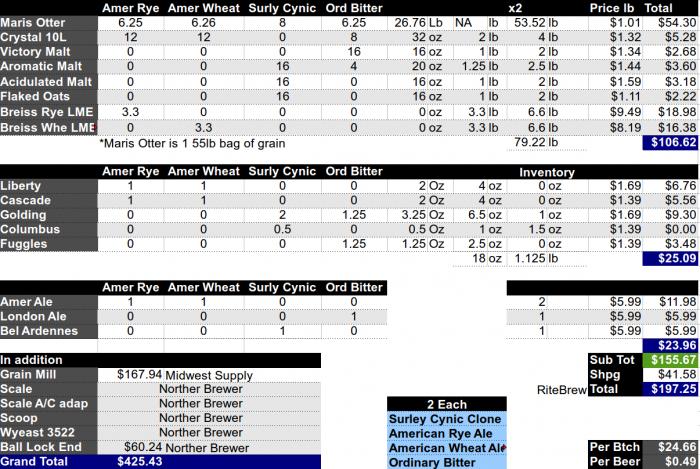Looking back at this thread, it's really not that hard to make 5 gallons of many brews for $10 ($2/gal), excluding the cost of fuels.
My LHBS sells 2-row at $0.78/lb in bulk, specialty grains at $1.71/lb, Wyeast at $6.50, White Labs at $7.25, dry packets $3-4 each and I buy my hops in bulk at $8-12 per lb. Using my own purchase prices and inventory, BeerSmith tells me the last 7 batches cost (alphabetically sorted):
*Black Pearl Porter - 10.50 gal - $31.52 - $3.00/gal
Centennial Blonde - 10.50 gal - $21.23 - $2.02/gal
Cream of Three Crops - 10.50 gal - $24.78 - $2.36/gal
Haus Pale Ale - 10.50 gal - $28.95 - $2.75/gal
*Kona Fire Rock Clone - 11.50 gal - $38.40 - $3.34/gal
Reaper's Mild - 10.50 gal - $27.38 - $2.60/gal
*Stone Ruination Clone - 10.50 gal - $46.98 - $4.47/gal
Cream of Three Crops comes out the clear winner, but it's lacking in flavor to me. I'm kegging EdWort's Haus Pale Ale today, but it already looks super promising to me. If I decide to keep it always on tap, I'll buy a full sack of Vienna (19% of grist), bringing the price of that grain down 37%. That would make 10.50 gallons $25.85, or $2.46/gal. The same could be said for buying a full sack of Chocolate malt for Milds.
If I didn't live in CA, my grain costs would be substantially lower, driving both recipes well below $2/gal.
* these recipe used 1 Wyeast or White Labs liquid yeast, plus a few cents of all-grain canned starter. All other recipes used two packets of dry yeast, rehydrated.




